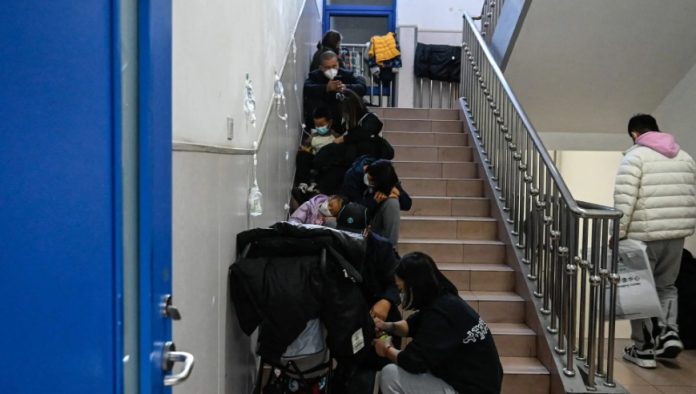As a result of the surge in respiratory diseases in China, especially among children, paediatric wards in urban hospitals are overcrowded, The Guardian reports.
Media outlets in China have reported that Beijing Children’s Hospital has been operating at full capacity for the past two months, receiving up to 9,378 patients per day. The newspaper also reported that outpatient clinics, paediatric clinics and respiratory departments of several Beijing hospitals are full for at least seven days ahead.
Last week, the World Health Organisation said it was monitoring a rise in the number of “undiagnosed pneumonia in children’s hospitals in Beijing, Liaoning and other places in China”.
Influenza-like illnesses are reported to be more than twice as high as in recent years, but authorities attributed the rise in cases to the start of the first flu season after pandemic restrictions were lifted and called for calm. At a news conference on Sunday, the national health commission urged local authorities to open more fever clinics, extend opening hours and increase the supply of medicines. Wang Huaqing, head of the CDC’s immunisation programme, said:
“We also remind everyone to adhere to the hygienic habits of wearing masks, ventilating frequently, and washing hands frequently, and encourage key groups such as the elderly and the young to actively receive relevant vaccines. Those who can be vaccinated should try their best to get vaccinated to prevent the occurrence of infectious diseases.”
They said the increase in cases was not due to new pathogens but to the spread of bacteria such as Mycoplasma pneumoniae and common pathogens including influenza, rhinovirus, adenovirus and RSV.
Chinese authorities responded to a WHO request for information within 24 hours and provided data that WHO said showed an increase in doctor consultations and hospitalisations of children for Mycoplasma pneumoniae since May, and RSV, adenovirus and influenza viruses since October. The WHO said this was not unusual given the factors contributing to the spread of the disease and did not recommend any travel or trade restrictions.
Maria Van Kerkhove, acting director of WHO’s department of epidemic and pandemic preparedness and prevention, said the rise in cases was in line with “what most countries faced a year or two ago”.
China became one of the latest countries to lift restrictions when it officially ended its zero-covirus policy in January. Other countries have seen a spike in respiratory illnesses since Covid-19 restrictions were lifted. Prof Francois Balloux, of University College London, told the Independent:
“This phenomenon of lockdown exit waves of respiratory infections is sometimes referred to as immunity debt. Since China experienced a far longer and harsher lockdown than essentially any other country on Earth, it was anticipated that those lockdown exit waves could be substantial in China.”
Neighbouring countries have expressed concern given the Chinese government’s lack of transparency regarding previous outbreaks, particularly Covid-19. Some governments are closely monitoring the outbreak, including in Taiwan, where the Centre for Disease Control has issued a warning about the need for better hygiene and symptom monitoring, given the large amount of travel and exchanges between the countries.
